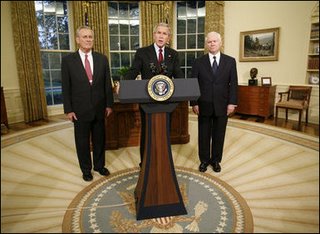Rumsfeld's story will make a fascinating book one day. He is a complex individual who has had an enviable array of experience that he has pulled off with a character all his own.
Accordingly, there is so much to write, I'll confine comments to the following questions and observations.
WHY NOW?
This swiftness of Rumsfeld's departure caught me by surprise, as I had been thinking if it were to come it would be after the Baker report, not before. However, the timing suggests that the President was prepared for the shift that occured in the elections; and he acted quickly in order to keep the initiative on his side, to avoid looking pushed around later on, to keep the opposition from being able to leave its own imprimatur on an effort that the President, IMO, expects will yet turn out well.
Perhaps the President was also influenced by the hard-hitting exchange between the DOD leadership and the "chorus of criticism".
ARE WE SCAPEGOATING RUMSFELD?
To answer that we have to know what Rumsfeld did wrong, to know whether he is being held falsely accountable.
The Army Times's editorial lays out its case that Rumsfeld had lost credibility with the military because of a welling up of misgivings about the war that threatened dangerously to spill over:
"Active-duty military leaders are starting to voice misgivings about the war’s planning, execution and dimming prospects for success."
and
"And although the blame for our failures in Iraq rests with the secretary, it will be the troops who bear its brunt. "
In a hard hitting reply, the DOD (perhaps Rumsfeld himself), laid out the counter-case, suggesting that the basis of the criticisms was water under the bridge, not newly soured milk on any topic. It's a hunch that the President was not comfortable with this frank exchange of views.
The time to settle credibility problems was in the 2004 election, quite arguably, when the WMD failure ought to have been politically adjudicated and those who had clear problems with the conceptualization of what could be achieved in Iraq, in either the short-term or the mid-term or within projected cost, ought to have carried the day. As it was, the "truth" of the SmearboatVets prevailed instead.
On that accounting, We The People are guilty and the Congress is guilty as well for having ceded such authority as they did, without seeing to it that the war was robustly planned, given the lack of a margin for error.
Firing Rumsfeld now, which is really just code for firing the President himself as the two are so closely allied on principles, is a collective mea culpa; and an amazing display of how inconsistency (irrationality?) in democracies can actually turn a ship upright. So, in the larger picture, Rumsfeld's departure is a kind of expiation of all our collective failure. This, however, will not assuage his own sense of having been unjustly turned on, I suspect, except if he comes to accept that it was useful to protect the military from blame, as the ATimes article concludes.
THIS LITTLE UNDERSTOOD WAR
I will miss Rumsfeld's ability to encapsulate an issue in just a few words ("Rummyspeak"), a product of his wonderful intellect and now part of our national heritage, thankfully.
In the Oval Office, he talked about how the war was little understood and complex. He may have meant that as a defense, in the sense that circumstances post 2001 had required action in advance of comprehensive thought or that action had been taken with the best understanding that was available at the time.
However, it is more instructive as a comment on the current problems and some of his own failings. If folks are uneducated about "the war", perhaps he shares some blame, because his political instincts, seems to me from afar, are to hold information (classified or otherwise), until such time as his opponents need to 'take an education', as it were, usually at their expense. Rumsfeld is a politician and not a professor in that respect. And his skills and discipline are formidable.
Perhaps this is where Gates will do better. Armed with the work that is coming out of the Iraq Study Group (via Jim Baker et. al.), work that ought to have been done as part of the State Department's 2002 Project for a Future Iraq, Gates may have a chance to adopt a different posture and close what daylight there is. And judging by the Pentagon's latest effort to get the word out (For the Record), there is plenty.


1 comment:
In another post I posted a link to comments offered up by a Spanish MP.
Here, sadly, is a redux on American unpreparedness and neglect, even at this late date in the Iraqi conflict.
Jeff Stein of the NYT goes around asking some people with wartime influence, "Do you know the difference between a Sunni and a Shiite".
October 17, 2006, Tuesday
By JEFF STEIN (NYT); Editorial Desk
Late Edition - Final, Section A, Page 21, Column 2, 1085 words
ABSTRACT - FOR the past several months, I've been wrapping up lengthy interviews with Washington counterterrorism officials with a fundamental question: ''Do you know the difference between a Sunni and a Shiite?'' A ''gotcha'' question? Perhaps. But if knowing your enemy is the most basic rule of war, I don't think ...
link
Post a Comment